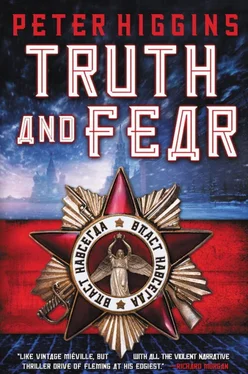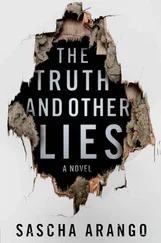Florian stayed to watch the body burn, feeling the heat on his face. He had to make sure. The smell of the body burning was very bad. The corpse writhed and thrashed as the fire took it. The head continued to scream and curse as its hair and flesh charred and crisped and peeled away.
One by one, Bez Nichevoi gave up all the deaths by which he had lived. Hundreds, thousands of deaths, human and otherwise, absorbed and accumulated during the long centuries of his existence. Antoninu Florian felt every one. The victims swirled around him in bitter smoke-clouds of sadness, surprise and pain, and their features flickered across his face like fire-shadow. Remembrance. Each death was as raw as the first.
Florian felt each one die. One by one, he reflected their dying faces back into the fire. He worked the subcutaneous muscles of his own humani form face–zygmatic, corrugator, depressor, levator, buccinator, orbicularis, risorus–until it was agony. Until the skin stretched tight across the shifting bones of his skull was reddened and swollen and burned as if stung by bees. Tears spilled down his cheeks and soaked his shirt. From time to time he turned away to vomit, until he was hollowed out and sour.
On and on they came, the many many dead, and Florian Antoninu wept.
Only when the blaze had collapsed in on itself and slumped to charred stumps and ash and the corpse of Bez Nichevoi was empty and quiet, only then did he turn and walk away, weakened, trembling.
Lom had been walking for six hours, looking for Maroussia. All night an uneasy windstream had bundled high dark cloud mass eastwards across the sky. Ragged clearings opened across patches of fathomless star-speckled darkshine. Moon-glimpses dilated and closed. Sometimes Lom knew where he was and sometimes he was lost. The steep intricate streets, courtyards and passageways of the Raion Lezaryet defeated system and pattern. As he walked he tried to make sense of Maroussia’s disappearance, but he could not. She had woken in the night. She had not dressed–her clothes were still in the attic–but she had taken the solm and a coat, and gone out into the dark and disappeared.
He climbed the Ship Bastion to see if she was there. He went down to the Purfas Gate, which was closed and barred and unattended. Taking a different route back, he passed the blank darkened windows of a watch repairer, a tailor, a bookseller showing lonely yellow lamplight in an upstairs room. A night reader. The streets of the raion smelled wild and ancient–old woodsmoke, damp stone cellars, pig yards and open drains. The snow, the river mist and the sky. A pony grunted and shifted uneasily on the other side of a fence. A bat flickered close past his face, an indistinct smudge of fur. Lom flinched as if it had touched him, but it had not.
He let the winding narrow streets take him where they would. There was a shape and rhythm to them that was not human. He saw openings and followed them. Narrow corners at acute angles he had to squeeze through sideways. Gateways too low for adults to pass through without bending. Gaps and gratings whose purpose he could not grasp. Rounding the bends of wandering alleyways he felt himself entering localities of awareness: attentive, watchful presences shadowing his, though he could see nothing. Frustrated, he felt himself walking along the edge of something. On the borderline of some discovery he could not make. Nightside. The only sounds were small ones: a latch rattling in the wind, the slump of snow disturbed in a gutter, and once the shriek of a street-scavenging fox. Crossing a wider cobbled square in a splash of moonshadow, he caught a trace of something different. A taint on the air. An intrusion. His stomach tightened. His neck prickled. Something sharp, cruel and disgusting had passed that way. An edge of panic began to scratch away at the edge of his mind and did not stop.
Three times during the night he returned to the house to see if Maroussia had come back. He roused Elena Cornelius and the Count and together they combed the building from cellars to attics. It had obviously occurred to both of them, though they did not say it, that Maroussia had gone. Slipped away. Abandoned him. Left the city. It was in their faces as they helped him search the house. Elena at least thought it would have been a good move. But Lom didn’t believe it. He went to Kamilova’s house and banged on the door, but no one came.
When dawn came and the Purfas Gate opened, he took the first tram of the day into the city, to the Lodka, on the possibility that Maroussia, unable to sleep, had decided to go there alone, to check it out, to be nearer the Pollandore, perhaps even to look for a way inside. It seemed unlikely, but he had no other ideas. None at all.
The wide open space in front of the Lodka, the immense Square of the Piteous Angel, was full of people, the atmosphere muted, determined, grim. Long lines had formed at temporary recruiting booths. Clerks took names under crude and blocky rust-coloured posters of comrades-in-arms charging with out-thrust bayonets, the men square-jawed, the women full-breasted, their hair like sheaves of corn. Those too old and infirm to sign up waited patiently to hand over their kopeks, their cutlery, their watches and chains and little pieces of jewellery at collection kiosks. The wind threw bitter scraps of snow in their faces.
A man came and stood next to him. Together they watched the slow-moving queues in silence for a while. The stranger glanced sideways at Lom.
‘Look at them,’ he said. ‘In other cities they lined the streets when the Archipelago came. But not us. Not here. Not Mirgorod. You understand that?’
Lom looked at the man sharply. Middle-aged, with faded thinning hair, the lenses of his glasses smeared, a day’s worth of dark red stubble on his chin and sagging neck. He wondered if he was a provokator . But there was a puzzled sadness in his face. He looked lost. He was just talking.
‘It’s their city,’ said Lom. ‘Their homes. Their families. They’re frightened.’
The man shook his head, as if he was trying to clear his mind. Bring things into focus. ‘Of course this isn’t everyone,’ he said. ‘This is the ones who came, not the ones who didn’t. There’s more will have stayed at home. And people are leaving. Lots are leaving. Did you hear that?’
‘It makes sense,’ said Lom. ‘If they’ve got somewhere to go.’
‘You?’ the man said.
‘What?’
‘You joining up?’
‘I’m looking for someone,’ said Lom. ‘I thought she might have come here. I didn’t know it was going to be like this.’
The man nodded. He understood that.
‘My wife’s gone somewhere,’ he said. ‘She took the girls. Our house is gone. When I got back there was just this hole, and the back wall sticking up out of a pile of bricks. You can see our wallpaper. The kitchen up in the air. It looks small. Seemed bigger when we were in it.’ He rubbed his hand down across his face as if he was wiping something away. ‘You haven’t seen her, have you? Her hair’s grey. Cut short. Like this.’ He touched the back of his neck above the collar. ‘She’s not so old, only forty-three, but grey. Not white, grey. A nice iron-grey. She would have had the girls with her.’
‘No,’ said Lom. ‘I haven’t seen them. Sorry.’
‘I waited the night but they didn’t come. We always said we’d move to the country. You know, if the war came here. They must have gone ahead, but I don’t know where. They’ll send word. When they’re settled.’
Lom didn’t have anything to say. After a while the man drifted away. ‘You take care now,’ he said as he went.
A murmur moved across the square, a turning of heads like wind across a lake. Lom smelled smoke. Somewhere fires were burning. From the direction of the Lodka a thick pall was rising and spilling across the crowd. Scraps of burned paper in the wind. He joined the drift of people moving towards the place. Worked his way to the front.
Читать дальше


![Кэмерон Доки - Правда и ее последствия[Truth and Consequences]](/books/79610/kemeron-doki-pravda-i-ee-posledstviya-truth-and-con-thumb.webp)









